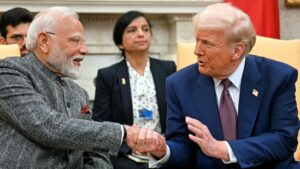GS II – International Relations

Key Highlights
- U.S. President Donald Trump reiterated his offer to mediate on Kashmir, claiming the U.S. had helped India and Pakistan arrive at a ceasefire.
- Trump posted on social media that he would work with both nations “even if after a thousand years” to resolve the Kashmir issue.
- India rejected the claim, reaffirming its long-standing position of bilateral resolution with Pakistan, rejecting third-party mediation.
- Congress party sought formal clarification from the government over the alleged acceptance of U.S. mediation.
- U.S. officials, including Vice-President and National Security Advisor, echoed Trump’s stance, but MEA and diplomatic sources in India denied the accuracy of those claims.
Detailed Insights
- Indian officials emphasized that the ceasefire negotiations had been conducted directly through military channels, not via external mediation.
- Trump’s reference to a “thousand years” of India-Pakistan conflict drew criticism for being historically inaccurate and diplomatically inappropriate.
- Former diplomats pointed out that India consistently follows a three-pronged approach: no third-party mediation, no internationalization of internal matters, and no “hyphenation” with Pakistan.
- The U.S. administration’s narrative is seen as misinformed and intrusive, lacking sensitivity to India’s diplomatic red lines.
Scientific/Technical Concepts Involved
- Mediation in International Law: A voluntary and non-binding intervention by a third party in a dispute to facilitate negotiation and settlement. India has consistently refused international mediation on Jammu and Kashmir citing Simla Agreement (1972) and Lahore Declaration (1999).
Significance
- The reiteration of mediation claims by the U.S. tests India’s diplomatic boundaries and could have ramifications for Indo-U.S. ties.
- Preserving bilateral negotiation frameworks is critical to avoid internationalization of India’s internal issues, especially J&K.
- Also underscores the domestic political sensitivities surrounding Kashmir, both within India and in diaspora discourse abroad.




